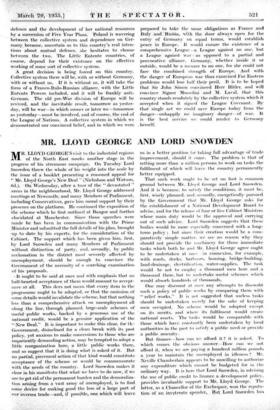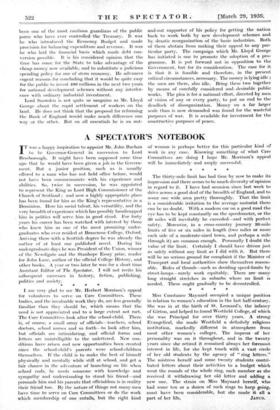MR. LLOYD GEORGE AND LORD SNOWDEN
MR. LLOYD GEORGE'S visit to the industrial regions of the North East marks another stage in the progress of his strenuous campaign. On Tuesday Lord Snowden threw the whole of his weight into the scale by -the issue of a booklet presenting a reasoned appeal for Mr. Lloyd George's New Deal " (Nicholson and Watson, 6d.).• • On 'Wednesday, after a tour of the " devastated " -areas in the neighbourhood, Mr. Lloyd George addressed meetings at -Newcastle, and many Members of Parliament, including Conservatives, gave him moral support by their presence on the platform. He continued the exposition of the scheme -which he first outlined at Bangor and further elucidated at Manchester. Since those speeches were made he • has been in communication with the Prime Minister and submitted the full details of his plan, brought up to 'date:by his experts, for the consideration of the Cabinets The support which has been- given- him, first, by Lord Snowden and many Members of Parliament without distinction of party, and, secondly, by public -acclamation in the district most severely affected. by 'unemployment; should be enough to convince the Government of the necessity of a searching examination his proposals. • . . .
• ; It-'ought-to be said at once and with emphasis that no halfhearted. acceptance of them would-amount to accept- ' Inlet,' at all. This dces not mean that every item in the programme ought to be adopted, or that the omission of some details would invalidate the scheme, but that nothing less than -a comprehensive attack on unemployment all along- the line, through planned, large-scale schemes of usefitl-public works,- backed by a generous use of the national credit,- would be a genuine application of the ",-New Deal." It is important to make this clear, for fin -Government, disinclined for a clean break with its past policy, yet anxious to make concessions to those who are impatiently demanding action, may be-tempted to adopt a little reorganization here,- a -little public works there, and so suggest that it is doing what is-asked of it. But no partial, piecemeal action of that kind would constitute acceptance of the scheme or would be commensurate with the needs of the country. Lord Snowden makes it clear in his manifesto that what we have-to do now, if we -are-to get rid of the permanent burden and the demoraliza- tion -arising from a vast army of unemployed, is to find some device for making good the loss- of a large part of our Oversee trade—and, if possible, -one which will leave us in a better position for taking frill advantage of trade improvement, should it come. The problem is that of setting more than a million persons.to work on tasks the fulfilment of which will leave the country permanently better equipped.
That such work ought to be set on foot is common ground between Mr. Lloyd George . and Lord Snowden. And it is because, to satisfy the conditions, it must be, first, wisely planned, and, secondly, energetically pursued by the Government. that Mr. Lloyd George asks for the establishment of a National Development Board to advise, and for the release of four or five Cabinet Ministers whose main duty would be the approval and carrying out of such advice. Lord Snowden suggests that these bodies would be more especially concerned with along- term policy ; but since their creation would be a com- paratively simple matter, we see no reason why they should not -provide the machinery for those immediate tasks which both he and Mr. Lloyd George agree ought to be undertaken at once—in connexion, for example, with roads, docks, harbours, housing,• bridge-building, land-drainage, electrification, water-supplies. The task would be not to employ a thousand men here and a thousand there, but to undertake useful schemes which would absorb hundreds of thousands.
One may discount at once any attempts to discredit such a policy of public works by comparing them with "relief works." _It is not suggested that useless tasks should be undertaken merely for the sake of keeping men occupied. No scheme ,would be adopted except on its merits, and where its fulfilment would create • national assets. The tasks would be comparable with those which have constantly been undertaken by local authorities in the past to satisfy a public need or provide a public ,anieuity. • But finance—how can we afford it ? it is asked. To which comes the obvious answer—How can we not afford it, when we are paying a hundred million pounds a . year to maintain the unemployed in idleness ? Mr. Neville Chamberlain appears to be unwilling to authorize any expenditure which cannot be budgeted for in the ordinary way. It is here that Lord Snowden, in advising the use of public,credit to finance a development policy, provides invaluable support to Mr. Lloyd George. The latter, as a Chancellor of the Exchequer, won the reputa- tion of an inveterate spender, But Lord Snowden has been one of the most cautious guardians of the public purse who have ever controlled •the Treasury. It was he who introduced the Economy Budget and made provision for balancing expenditure and revenue. It was he who laid the financial basis which made debt con- version possible. It is his considered opinion that the time has come for the State to take advantage of the cheap money now available, and to substitute a judicious spending policy for one of stern economy. He advances cogent reasons for concluding that it would be quite easy for the public to invest 400 millions in the next two years for national development schemes without any interfer- ence with ordinary industrial investment.
Lord Snowden is not quite so sanguine as Mr. Lloyd George about the rapid settlement of workers on the land. He does not think that the proposal for reforming the Bank of England would make much difference one way or the other. But on all essentials he is an out- and-out supporter of his policy for getting the nation. back to -work both by new development schemes and by drastic reorganization of the basic industries. Both of them- abstain from making their appeal to any par- ticular party. The .campaign which Mr. Lloyd. George has initiated is one to promote the adoption of. a pro- gramme. It is put forward not in opposition to the. Government, but. for its consideration. The case for it is that it is feasible and therefore, in the present critical circumstances, necessary. The money is lying idle ; the men are there, also idle. Bring these two together by means of carefully considered and . desirable public. works. The plea is for a national effort, directed by men of vision of any or every party, to put an end to the. deadlock of disorganization. Money on a far larger scale than is now demanded was found for the wasteful purposes of war. It is available for investment for the constructive purposes of peace.







































 Previous page
Previous page